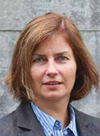Editorial
Dear Readers,
Our three research groups have been very prolific again during the past year. In their research, members of the first of our three research fields, Concepts and Taxonomies, currently focus on the analysis of concepts of religion: they organized a lecture series by the title of “Concepts of Religion in the Modern Age” in the fall term. Philipp Hetmanczyk offers his insights by summarizing the gist of this lecture series. The group is currently organizing an international conference “Concepts of Religion between Asia and Europe” that will take place in the fall term of 2012. Raji C. Steineck and Christoph Uehlinger, coordinators of the research focus “Religion,” elaborate on their research questions, aims, and trajectories in a dialogue with Ulrich Brandenburg.
Having established an interdisciplinary doctoral program in 2009, the URPP Asia and Europe has welcomed two generations of graduate students to join and study with us in what we consider to be a substantially improved environment. How do the doctoral students themselves feel about this program? Eliza Isabaeva portrays three participants and takes an insider’s perspective on the motivation and goals of these young researchers.
Last November, the Institute of East Asian Studies―in cooperation with the URPP Asia and Europe, the Department of Cinema Studies and the Department of Indian Studies―carried out an international workshop on “Ghosts in Asian Cinemas” at the Ethnographic Museum of the University of Zurich. In her report on this workshop, Dinah Zank writes about the varieties and manifestations of ghosts in Asian movies as well as about the fine line between near-death experiences and ghostliness.
Our Bulletin has been designed to provide firsthand information that includes our latest news and upcoming events. The next lecture series “Circulating Norms: Human Rights and Gender in a Globalized World,” organized by Research Field 3: Norms and Social Order(s), will take place on March 20, May 15, and May 29, so please save the dates.
Our visiting scholars Jun’ichi Isomae (International Research Center for Japanese Studies, Kyoto) and Jakob de Roover (Ghent University) left us by the end of 2011. We would like to thank both of them for their admirable engagements in various teaching and research activities during their time in Zurich. At the same time we would like to welcome Fabian Schäfer who, as our new senior research associate, will be affiliated with Research Field 3.
Finally, let me express our special thanks to the doctoral students Ulrich Brandenburg, Philipp Hetmanczyk, Eliza Isabaeva and Dinah Zank for their valuable contributions to this volume.
Prof. Dr. Andrea Riemenschnitter
Academic Director
(Asia & Europe Bulletin, 1/2012, p. 3)
